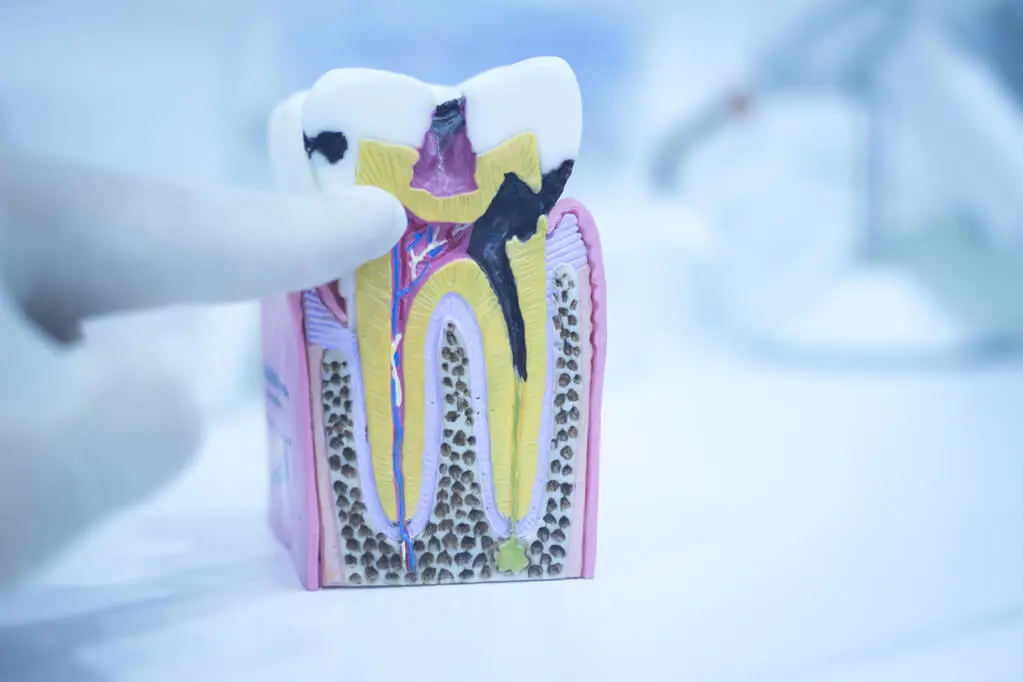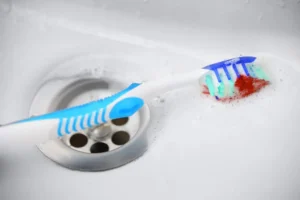What is Flossing?
Flossing is a vital component of maintaining good oral hygiene. It involves using a thin thread-like material, usually made of nylon or Teflon, to remove plaque and food particles from between the teeth.
While brushing alone is effective at cleaning the surfaces of the teeth, flossing reaches the areas that a toothbrush can’t, such as the tight spaces between the teeth and along the gum line. Regular flossing can help prevent gum disease, tooth decay, bad breath, and other oral health issues.
In this article, we will explore the surprising benefits of daily flossing and why it should not be skipped as part of our dental care routine.
Why is Flossing Important?
Flossing is an essential part of maintaining good oral health. Many people underestimate the importance of flossing, but it plays a crucial role in preventing dental plaque formation and gum inflammation.
Dental plaque is a sticky film that forms on the surface of our teeth. It is made up of bacteria, food particles, and saliva. If not removed properly, plaque build-up can lead to gum inflammation, which is the early stage of gum disease. Regular flossing helps remove plaque from between the teeth and along the gum line, preventing its accumulation.
By regularly flossing, you can significantly reduce the risk of developing gum disease and tooth decay. Furthermore, maintaining good oral health can have long-term benefits for your overall wellbeing. Unhealthy gums and teeth have been linked to a higher risk of heart disease and other health conditions. On the other hand, a healthy mouth has been shown to promote better heart health.
By flossing daily, you can prevent gum disease, tooth decay and bad breath while keeping your mouth healthy.

Dental Health Benefits of Flossing
When it comes to maintaining good oral health, flossing is often an underrated practice. However, daily flossing can provide surprising benefits that go beyond just clean teeth. By removing plaque and preventing its build-up, flossing helps prevent gum inflammation and reduces the risk of gum disease and tooth decay. But the benefits don’t stop there. Research has shown that a healthy mouth can also contribute to better heart health and reduce the risk of other health conditions.
Reduce Risk of Tooth Decay
Regular flossing is a crucial step in maintaining excellent oral health and reducing the risk of tooth decay. While brushing your teeth twice a day is important, it may not effectively remove all the leftover food particles and plaque between your teeth. This is where flossing comes in.
Prevent Oral Health Issues
Flossing helps to remove the food particles and plaque that your toothbrush may miss, especially in those hard-to-reach areas. If left untouched, this leftover debris can lead to the formation of tartar, a hardened and stubborn substance that can contribute to tooth decay and gum disease. By flossing daily, you can effectively remove these materials, preventing the build-up of tartar and reducing the chances of developing oral health issues.
Prevent Tooth Decay and Gum Disease
Flossing plays a significant role in preventing tooth loss. According to statistics, tooth loss is a common problem among adults, with nearly 178 million individuals in the United States missing at least one tooth. Regular flossing can help in maintaining healthier teeth and gums, reducing the risk of tooth loss caused by decay and gum disease.
Incorporating flossing into your daily dental hygiene routine is essential for reducing the risk of tooth decay. By removing leftover food and plaque, flossing prevents the build-up of tartar and decreases the chances of developing oral health problems.
Additionally, regular flossing helps to prevent tooth loss, promoting a healthier and more confident smile. Don’t skip the floss – your teeth will thank you!

Strengthen Enamel
Flossing is not only essential for maintaining healthy gums and preventing gum disease, but it also plays a crucial role in strengthening enamel. By removing plaque and food particles from between your teeth, flossing helps maintain the health of your tooth enamel.
What Is the Tooth Enamel?
Tooth enamel is the hard outer layer of the tooth, protecting it from decay and damage. However, plaque build-up and food particles can weaken enamel over time, making it more susceptible to cavities and tooth sensitivity. Regular flossing helps remove these harmful substances, reducing the chances of enamel erosion.
What Happens When the Enamel Is Weakened?
When enamel is weakened, it creates an environment where bacteria can thrive and produce acids that attack the tooth’s surface. This increases the risk of cavities and other oral health issues. Moreover, weakened enamel can lead to increased tooth sensitivity, causing discomfort and pain when consuming hot or cold substances.

Floss Correctly
To effectively strengthen enamel and prevent tooth decay, it’s important to floss correctly. Start by using about 18 inches of dental floss and gently guide it between your teeth, making a C-shape around each tooth and moving it up and down. Be sure to reach the gum line to remove any plaque or food particles hidden there.
Daily flossing is not only crucial for gum health, but it also helps strengthen enamel and prevent tooth decay. By removing plaque and food particles, you can maintain the health of your tooth enamel and reduce the risk of cavities and tooth sensitivity.
Reduce Risk of Gum Disease
Regular flossing is not only crucial for maintaining healthy teeth, but it also plays a significant role in reducing the risk of gum disease. Gum disease, also known as periodontal disease, is a common oral health issue characterized by inflammation and infection of the tissues that support the teeth.
When plaque and food particles aren’t cleaned from the gum line, they can form tartar, which irritates the gums and leads to gingivitis.

Consistent Flossing
Consistent flossing helps remove plaque and food particles from between the teeth and along the gum line, preventing the development of gum inflammation. By removing these harmful substances, flossing helps to keep the gums healthy and reduces the risk of gingivitis.
If left untreated, gingivitis can progress to a more severe form of gum disease called periodontitis. Periodontitis can cause the gums to recede, leading to tooth loss and potential damage to the bone that supports the teeth.
By incorporating regular flossing into your oral hygiene routine, you can effectively remove plaque build-up and reduce the risk of gum inflammation and gum disease. It is recommended to floss at least once a day, ensuring that you reach all the areas between your teeth and along the gum line for optimal oral health.
Freshen Breath
Flossing isn’t just important for maintaining healthy teeth and gums; it can also significantly freshen breath. When we eat, food particles can become stuck between teeth. If left there, these particles can deteriorate, leading to an unpleasant odor in our mouths.
However, by incorporating flossing into our daily oral hygiene routine, we can prevent this build-up and keep our breath fresh. Flossing after meals helps remove any remnants of food that may have gotten lodged between our teeth. The simple act of using dental floss to reach these tight spaces can effectively remove the food particles responsible for the unpleasant odor.
Regularly flossing can leave our mouths feeling refreshed and our breath noticeably fresher. By taking a few minutes each day to floss, we can ensure that we are eliminating the source of bad breath at its roots.
So, don’t underestimate the power of flossing when it comes to freshening your breath. Incorporating this simple step into your oral hygiene routine, especially after meals, can make a significant difference in keeping your breath smelling clean and pleasant all day long.

Other Health Benefits of Flossing
Flossing is not just beneficial for maintaining fresh breath and preventing gum disease. Regular flossing also offers several surprising health benefits that go beyond oral hygiene.
Improved Heart Health
One of the lesser-known advantages of daily flossing is its ability to improve heart health. Studies have shown a strong correlation between gum disease and cardiovascular disease, suggesting that practicing good oral hygiene, including regular flossing, can reduce the risk of heart disease.
The American Heart Association recommends regular flossing as part of a comprehensive oral hygiene routine to support heart health.
Improves Overall Systemic Health
Additionally, flossing can have positive effects on overall systemic health, such as reducing the risk of certain conditions like rheumatoid arthritis and inflammatory bowel disease. By incorporating flossing into our daily routine, not only are we keeping our mouths clean and fresh, but we are also taking proactive steps towards improving our overall health.
Lower Risk of Cardiovascular Disease
Flossing isn’t just important for oral health – it can also have surprising benefits for your cardiovascular health. Research has suggested a potential link between periodontal disease, which is the inflammation of the gums, and arteriosclerosis, a condition characterized by the build-up of plaque in the arteries.
How Does This Connection Work?
Oral bacteria have been found in the plaques that form in the arteries, indicating that they may play a role in the development of arteriosclerosis. Additionally, the inflammation caused by periodontal disease can contribute to the inflammation and plaque formation in the arteries.
By flossing daily, you can help remove food particles and plaque build-up between your teeth and along the gum line, reducing the risk of periodontal disease. This, in turn, may lower the risk of cardiovascular disease.
Linked to Reduced Risk of Rheumatoid Arthritis
In addition to its benefits for cardiovascular health, daily flossing may also be linked to a reduced risk of rheumatoid arthritis.
What the Experts Say
A study published in the Journal of Periodontology found a higher prevalence of gum disease among arthritis patients, indicating a potential connection between the two conditions.
One shared factor between rheumatoid arthritis and gum disease is inflammation. Both conditions involve an inflammatory response in the body, and it is believed that this inflammation may be the link between them. The inflammation caused by gum disease can contribute to the development and progression of rheumatoid arthritis.

Reduce the Risk of Developing Rheumatoid Arthritis
By practicing good oral hygiene habits, including daily flossing, one may help reduce the risk of gum disease. This, in turn, might have a positive impact on the risk of developing rheumatoid arthritis. While more research is needed to fully understand the relationship between the two conditions, this finding suggests that taking care of our oral health may have benefits beyond just having a healthy mouth.
So, next time you reach for your dental floss, remember that in addition to reducing the risk of periodontal disease and cardiovascular issues, it may also play a role in decreasing the risk of rheumatoid arthritis. Incorporating daily flossing into your oral hygiene routine is a small but powerful step in maintaining overall health.
Linked to Improved Oral Hygiene for Overall Health and Wellbeing
Daily flossing is more than just a habit for healthy teeth and gums, it is linked to improved oral hygiene which can positively impact overall health and wellbeing.
Pregnant Women
For pregnant women, daily flossing is particularly important. Poor oral health during pregnancy has been associated with health complications such as premature birth and low birth weight. By keeping the gums healthy and reducing the risk of oral inflammation, daily flossing contributes to a healthier mouth, which can positively impact the overall health of both the mother and the baby.

Types of Dental Floss Available on the Market Today
As you know, when it comes to maintaining good oral hygiene, flossing plays a vital role. But with so many options available on the market, it can be overwhelming to choose the right dental floss. From traditional string floss to innovative interdental brushes and super floss designed for braces, there are a variety of types to meet different needs and preferences.
Whatever your oral health needs may be, there is a dental floss out there to help you keep your gums healthy, your teeth clean, and your smile bright. Let’s explore the different types of dental floss available today and choose the one that’s best suited for you.
Traditional String Floss
Traditional string floss is a tried and true method for maintaining oral hygiene. There are two main types of traditional string floss: waxed and unwaxed. Waxed floss has a thin layer of wax coating, which helps it glide between teeth smoothly. On the other hand, unwaxed floss has a natural texture that provides a better grip on plaque and food particles.
Waxed vs Unwaxed: their effectiveness
When it comes to choosing between waxed and unwaxed floss, it is mostly a matter of personal preference. The American Dental Association states that there is no significant difference in effectiveness between the two types. Both options effectively remove plaque and debris from between the teeth and along the gum line.
Other Options
In addition to the two types of traditional string floss, there are also alternative options available. Tape floss is wider and flatter, making it suitable for those with wider spaces between their teeth.
Super floss is designed specifically for individuals with braces, bridges, or gaps between their teeth. It has a stiff end for threading, a spongy middle section, and regular floss for proper cleaning.
Ultimately, the choice of floss depends on personal preference and individual oral health needs. Incorporating any type of floss into a daily oral hygiene routine is crucial for maintaining optimal dental health.
Conclusion
Daily flossing is an important part of a comprehensive oral hygiene routine and it has more health benefits than you may realize.
In addition to reducing the risk of periodontal disease and cardiovascular issues, regular flossing can play a role in decreasing the risk of rheumatoid arthritis, especially for pregnant women.
When it comes to choosing the right type of floss, there are many options available. Whether you choose traditional string floss, tape floss, or super floss, the most important thing is that you make it part of your daily routine.
Daily flossing can lead to improved oral health and overall wellbeing. So don’t skip the floss!





